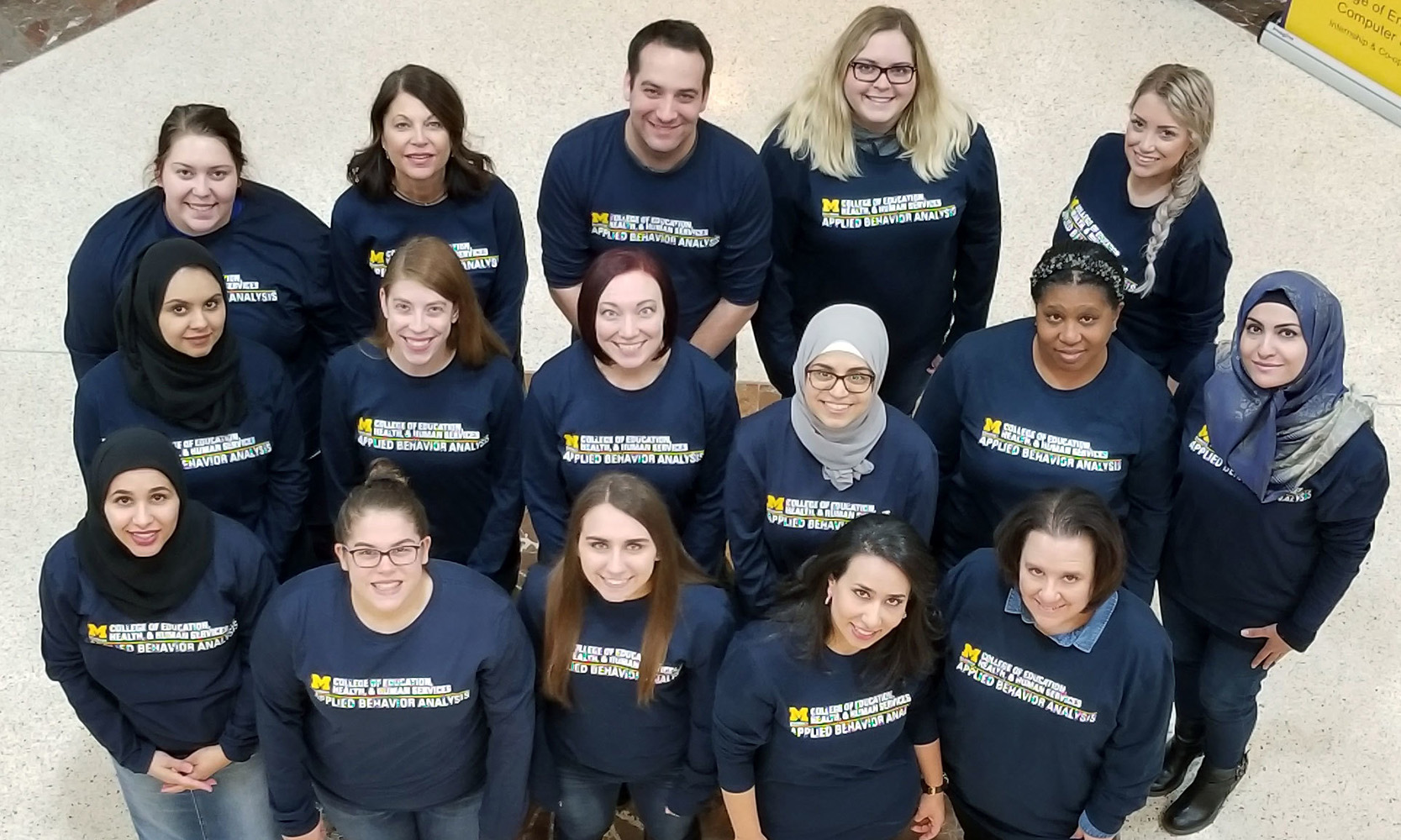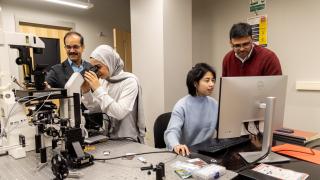
When UM-Dearborn launched a slate of new programs for the study of Applied Behavior Analysis back in 2017, it was, in part, motivated by a crisis of supply and demand. Families were increasingly seeking out the powerful therapy that’s used often, but not exclusively, for children with autism. But you could hardly find a clinic or hospital that wasn’t hurting from a shortage of trained ABA clinicians.
Two years later, the College of Education, Health, and Human Services programs — which include certificate- and master’s-level options — are off to a solid start. Enrollment in the graduate program is particularly strong. And you’re also starting to see evidence of some important, culture-shaping intangibles — like a diverse inaugural cohort of students who are bringing their own strengths to the young program.
In this semester’s master’s-level Ethics in Applied Behavior Analysis course, for example, you’ll find 16 individuals who not only represent a range of ages and demographics, but bring a diverse collection of life experiences. While some are ABA rookies, others have been doing some form of behavior therapy work for years. And many, like social worker Yolanda Carpenter, elementary educator Shereen Tarraf and psychologist Steve Rowe, are heading back to the classroom following years of work in other fields.
One common thread running through many of their stories is a powerful personal encounter with ABA therapy. Rowe, in fact, has had several such moments, including a memorable experience at his clinic where a child was having such difficulty eating that even being around food — even seeing a spoon — inspired an intense reaction.
In that case, Rowe said the behavior therapist designed a program that started with the child holding the spoon, but without putting it to his mouth. Then, she asked the child to do that in the presence of food, but without making contact with the food. Gradually, they added more steps to the process until the child was successfully feeding himself. “I remember feeling like, as a psychologist, I could never have gotten that result,” Rowe said. “Seeing ABA in action like that sort of blew me away.”
That story is a decent shorthand for an important part of the ABA philosophy. Unlike many therapeutic approaches that focus on the root causes of emotional or psychological issues, ABA puts the emphasis on shaping behavior. A behavior is broken into smaller, more achievable steps by trained clinicians. Each incremental success is then met with positive reinforcement, until gradually, over time, a new desired behavior becomes comfortable and routine.
The results can feel like magic, especially when condensed down to a success story. But teaching lasting positive behaviors can mean months of steady work and usually involves crafting highly individualized therapeutic programs.
“One of the things we’re learning is that there is no standard treatment for all kids — or even kids that have similar challenges,” said master’s student Lara Merhi. “With ABA, the treatments are individualized and designed based on careful assessment of each person. You don’t just try something because you know it’s worked for someone else. So you have to think of each case as unique and resist the urge to take shortcuts.”
That constant intensity — and the fact that clinicians are working with clients, most often children, who have complex needs — means ABA is an emotionally demanding field. In fact, when we asked the students to talk about their biggest challenges, their initial list didn’t include mastery of a particularly tough subject or the certification exam. Instead, their deepest concerns were whether they had the near-superhuman levels of patience required for the work; how they could maintain a healthy work-life balance; and navigating the tricky territory of professional ethics in an emerging field.
Fortunately, Professor Kim Killu says the comprehensive master’s curriculum gives the students the tools to deal with many of these issues. Some, like ethics, are integrated right into the curriculum; others they’ll explore while working alongside experienced mentors during the 1,500 hours of supervised field work required for professional certification.
Many students shared big ideas for what comes after. Yolanda Carpenter wants to use her expertise to open an experiential toy store for children with autism. Hafez Gobah sees himself someday running his own clinic, possibly in his home country of Yemen, where a multi-year civil war is creating a generation of children with emotional traumas. And Shereen Tarraf sees herself working within demographic communities that have particularly strong stigmas around disabilities and mental health.
That’s all evidence for one of Killu’s strongest beliefs: That ABA, though most often framed as a clinical treatment for autism, has the power to reach far beyond that. If the students’ aspirations are any indication, the possibilities for this emerging program seem big indeed.
UM-Dearborn has several options for students interested in careers in Applied Behavior Analysis, including: the Registered Behavior Technician (RBT) certificate; the Board Certified Assistant Behavior Analyst (BcaBA) certificate; the Board Certified Behavior Analyst (BCBA) certificate; and M.S. degree in Applied Behavior Analysis leading to the certificate. For more information, please contact Professor Kim Killu at [email protected].






